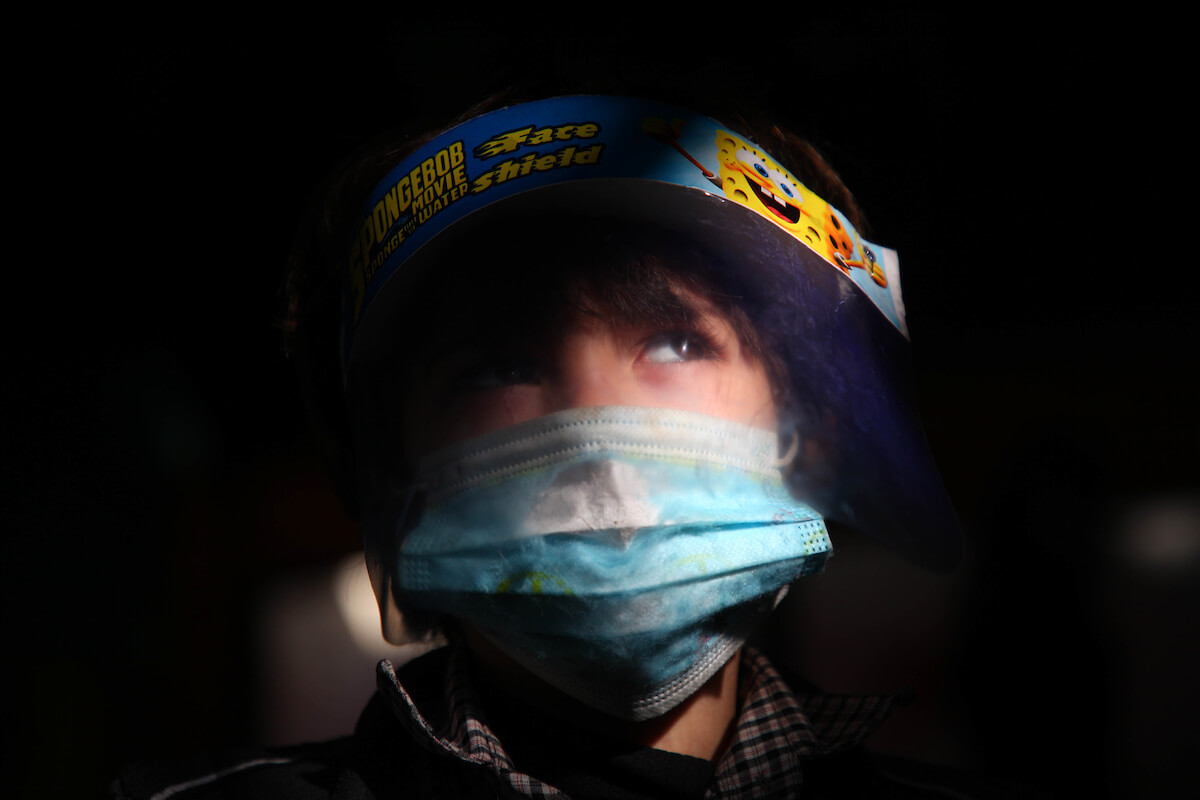
Palestinian children, clad in masks and face-shields due to COVID-19 pandemic, play inside their kindergarten, in Gaza City on November 23, 2020. (Photo: Mahmoud Ajjour/APA Images)
Over the past few months, the coronavirus has become a part of Palestinian’s everyday reality. Long gone are the days of fear and panic that surrounded the initial outbreak in the early days of the pandemic.
Palestinians, like many other people around the globe, have largely settled into a new reality, accepting COVID-19 as an unfortunate reality, but a reality they must live with nonetheless. For months, restaurants have remained open, gyms and salons as well, and school and government offices have tried to stay up and running as consistently as they can.
It’s been months since Palestinians in the West Bank have witnessed any sort of lockdown, despite rising cases, and the only indication that there is a pandemic going on is the occasional checkpoints set up by PA police to fine people for not wearing masks.
News headlines have largely moved on from COVID-19, focusing instead on current events like daily attacks and infringements by the Israeli occupation, and the ever changing regional and international political climate.
Even everyday conversations with friends have moved on from discussing the daily rate of infection, to “pre-pandemic” topics of conversation.
That is, until this week.
With close to 2,000 new cases reported in Palestine in the past 24 hours alone, the daily rate of infection continues to grow, particularly in the Nablus and Bethlehem districts of the West Bank. Last week, Gaza saw a record high of daily new cases of the virus in the territory.
The total number of COVID-19 cases in the West Bank, Gaza, and East Jerusalem currently stands at 89,558.
The start of winter has caused additional concern among health officials, as the seasonal flu has become a major issue in addition to the coronavirus.
After days of rapidly rising COVID-19 infection rates, the Palestinian Authority (PA) announced that it has decided to impose a new series of lockdowns in the West Bank beginning this Friday, November 27th.
For the next two weeks, we will see a complete lockdown, including restrictions on movement within and between cities and governorates, on Friday and Saturday, save essential businesses and institutions like hospitals and clinics. Pharmacies, bakeries, and grocery stores.
During the week, from Sunday – Thursday, the government will be enforcing a curfew from 7pm-6am, in an effort to reduce heavy traffic to restaurants, shops, gyms, and event halls that typically occurs at night. Schools, offices, and businesses will remain open as normal during daytime hours.
On Wednesday, Israeli Prime Minister Benjamin Netanyahu expressed concerns over the growing rate of infection in the oPt, saying he was considering closing checkpoints between Israel and the West Bank, a move that would affect thousands of Palestinian laborers who work in Israel.
The dawn of a new round of closures has caused quite a stir on the ground, as it’s all most people can talk about.
Many of the friends and colleagues I speak to are doubtful about how strictly the government is going to enforce the closures, due to the fact that during the brutal second wave of the virus we saw this summer, there was little done on part of the government to restrict movement or enforce things like mask mandates.
Others are concerned that if the lockdowns continue, it could affect Christmas holidays, especially in Bethlehem where health officials are seeing one of the worst spreads of the virus.
The mayor of Bethlehem has already announced measures to “celebrate Christmas virtually,” with livestreams of church services and the midnight mass at the Nativity Church, which typically gathers hundreds of worshipers.
“We will not risk the lives of our people in order to be festive. Life and health of people are more important for us and gathering of people in the streets will increase the risk of infection,” Mayor Anton Salman said.
Other officials have floated the idea of imposing restrictions on family gatherings, something that Christian families were hoping to avoid, after already suffering major blows to the Easter holidays earlier this year.
It’s become increasingly clear that the last two months of 2020 aren’t going to be as easy as we thought — in Palestine, or anywhere else.
 RSS Feed
RSS Feed















 November 26th, 2020
November 26th, 2020  Awake Goy
Awake Goy  Posted in
Posted in  Tags:
Tags: 













